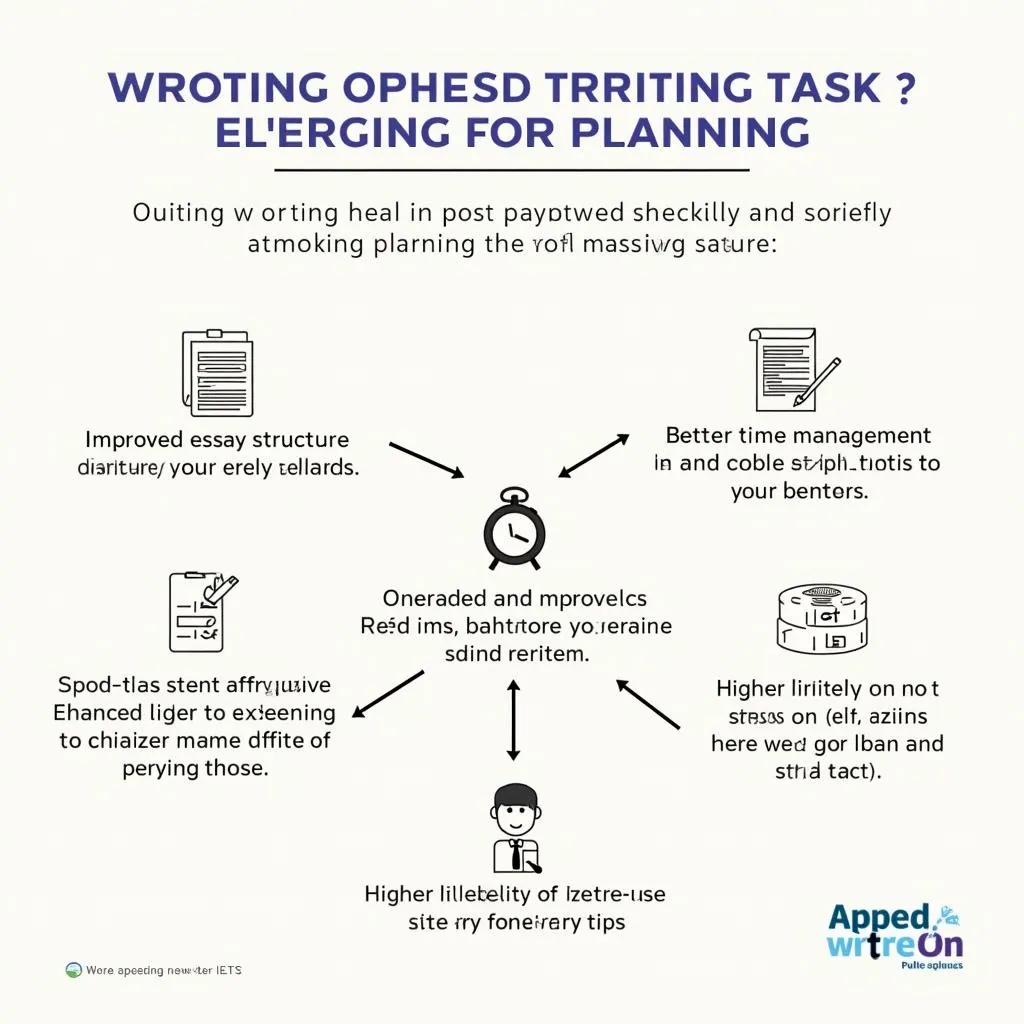Understanding the Importance of Planning in IELTS Writing Task 2
Planning is a crucial step in IELTS Writing Task 2 that can significantly impact your overall performance. A well-structured plan helps you organize your thoughts, develop a coherent argument, and ensure you address all aspects of the question. This preparatory phase can make the difference between a mediocre and an outstanding essay.
Benefits of Effective Planning
- Improved essay structure
- Better time management
- Enhanced coherence and cohesion
- Reduced stress during writing
- Higher likelihood of addressing all parts of the question

Essential IELTS Writing Task 2 Planning Strategies
1. Analyze the Question Thoroughly
Before you start planning your essay, it’s crucial to understand the question completely. Follow these steps:
- Identify the topic and task type (e.g., agree/disagree, discuss both views, advantages/disadvantages)
- Underline key words and phrases
- Determine the number of parts in the question
- Consider the scope and limitations of the topic
Example:
Question: “Some people believe that unpaid community service should be a compulsory part of high school programs. To what extent do you agree or disagree?”
Key elements:
- Topic: Unpaid community service in high schools
- Task type: Agree/disagree
- Key words: “unpaid,” “community service,” “compulsory,” “high school programs”
2. Brainstorm Ideas and Examples
Once you’ve analyzed the question, spend 2-3 minutes generating ideas and examples. Use techniques such as:
- Mind mapping
- Listing pros and cons
- Drawing from personal experiences
- Considering different perspectives (social, economic, cultural)
Remember to think of specific examples that support your main points, as these will make your essay more convincing and help you achieve a higher score in Task Achievement.
3. Create a Clear Essay Outline
Develop a structured outline for your essay, typically following this format:
-
Introduction
- Hook or general statement
- Paraphrase the question
- Thesis statement (your position)
-
Body Paragraph 1
- Topic sentence
- Supporting point 1 + example
- Supporting point 2 + example
-
Body Paragraph 2
- Topic sentence
- Supporting point 1 + example
- Supporting point 2 + example
-
Conclusion
- Restate your position
- Summarize main points
- Final thought or recommendation
4. Allocate Time Wisely
Effective time management is crucial for IELTS Writing Task 2. Here’s a recommended time allocation:
- Planning: 5 minutes
- Writing: 30 minutes
- Reviewing: 5 minutes
By sticking to this timeline, you ensure that you have enough time to develop your ideas fully and review your work for errors.
5. Use Planning Shortcuts
Develop a system of symbols and abbreviations to make your planning process more efficient. For example:
- “+” for advantages or supporting arguments
- “-” for disadvantages or opposing arguments
- “e.g.” for examples
- “→” to show cause and effect relationships
These shortcuts can help you jot down ideas quickly during the planning phase, leaving more time for actual writing.
Common Pitfalls to Avoid in IELTS Writing Task 2 Planning
- Spending too much time planning: While planning is important, don’t spend more than 5 minutes on it.
- Neglecting to address all parts of the question: Ensure your plan covers every aspect of the task.
- Failing to include specific examples: Remember to note down relevant examples during your brainstorming session.
- Ignoring the word count: Keep in mind that your essay should be at least 250 words long when planning your content.
- Writing a full draft during planning: Focus on creating an outline, not writing complete sentences.
Next Steps: Practice and Refinement
To improve your IELTS Writing Task 2 planning skills:
- Practice planning for various question types regularly
- Time yourself during practice sessions
- Review sample high-scoring essays to understand effective planning techniques
- Seek feedback from a teacher or study partner on your planning approach
- Experiment with different brainstorming methods to find what works best for you
By consistently applying these strategies and refining your planning process, you’ll be well-prepared to tackle IELTS Writing Task 2 with confidence and achieve a higher score.
Remember, effective planning is the foundation of a well-written essay. It allows you to present your ideas clearly and coherently, demonstrating to the examiner that you can produce a well-organized and logically developed response under time pressure. With practice, your planning skills will improve, leading to better overall performance in IELTS Writing Task 2.